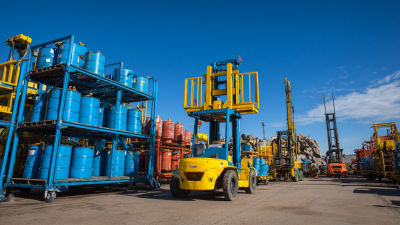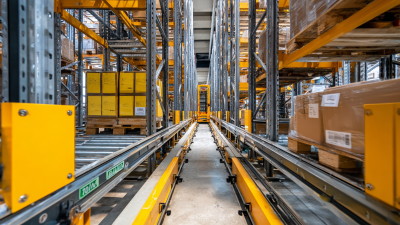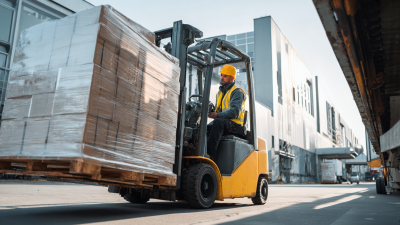Revolutionizing Warehouse Efficiency: The Role of Industrial Carts in Modern Logistics
In the rapidly evolving landscape of modern logistics, the role of industrial carts has emerged as a transformative force in enhancing warehouse efficiency. According to the latest industry reports, logistics costs account for approximately 8% of the global GDP, translating to trillions of dollars annually. The integration of industrial carts into warehousing operations is proven to improve material handling efficiency by up to 30%, significantly reducing labor costs and optimizing space utilization. As facilities continue to seek innovative solutions to streamline operations amidst increasing e-commerce demands, the deployment of industrial carts becomes essential for maximizing productivity and ensuring a swift response to market needs. By revolutionizing how goods are transported within warehouses, industrial carts not only bolster operational flexibility but also contribute to sustainability efforts through the reduction of waste and resource consumption.

The Evolution of Industrial Carts in Modern Warehousing
The evolution of industrial carts in modern warehousing has dramatically transformed logistics operations. Traditionally viewed as basic transport equipment, industrial carts have progressed to become essential tools that enhance workflow efficiency. As the demands of the marketplace increase, so do the innovations in cart design, integrating features like ergonomic handles, modular configurations, and specialized compartments tailored for various tasks. This evolution allows warehouses to optimize storage space and improve the speed of inventory handling.
Tips for maximizing the benefits of industrial carts include regularly assessing your cart needs based on the types of goods handled. For instance, utilizing carts with adjustable shelving can cater to both small items and bulkier shipments. Additionally, training staff on proper cart handling can prevent injuries and ensure smoother operations.
Moreover, incorporating technology, such as RFID tracking systems into industrial carts, allows for real-time inventory management. This advancement not only streamlines the picking process but also enhances accuracy in stock levels. By embracing the evolution of industrial carts, warehouses can significantly improve productivity and create a more efficient logistics environment.
Key Features That Enhance Warehouse Efficiency
Industrial carts play a pivotal role in enhancing warehouse efficiency, a key focus in modern logistics. According to a report by Grand View Research, the global logistics market is projected to reach $12 trillion by 2027, emphasizing the need for more streamlined operations. Implementing well-designed industrial carts can reduce labor costs by up to 30%, as they facilitate quicker movement of goods across the warehouse floor and minimize the chances of workplace injuries.
One of the most important features of these carts is their adaptability. Many modern industrial carts come with adjustable shelving and modular designs, allowing warehouses to customize them based on specific operational needs. Additionally, the integration of ergonomic features ensures that workers can maneuver these carts effortlessly, leading to increased productivity. A study by the Occupational Safety and Health Administration (OSHA) indicated that ergonomic improvements could boost employee productivity by approximately 25%. By adopting industrial carts with such advanced capabilities, warehouses are not only optimizing their space but also enhancing overall safety and productivity in today's fast-paced logistics environment.

Integration of Digital Technology in Industrial Cart Design
In the rapidly evolving landscape of logistics, the integration of digital technology into industrial cart design marks a significant breakthrough in warehouse efficiency. Modern industrial carts are no longer just plain vessels for transporting goods; they have evolved into smart solutions equipped with sensors, RFID technology, and IoT capabilities. These advancements allow for real-time tracking of inventory, enabling warehouse managers to optimize stock levels and streamline operations. By leveraging data analytics, organizations can predict demand patterns, reduce downtime, and enhance the overall productivity of their supply chain.
Moreover, digital technology facilitates better communication between industrial carts and warehouse management systems. For instance, carts can communicate directly with automated guided vehicles (AGVs) or robotic sorting systems, ensuring seamless transitions and reducing human error. The incorporation of user-friendly interfaces allows operators to monitor and control the carts more efficiently, adjusting routes or tasks as needed. This synchronization not only minimizes delays but also leads to a more flexible and responsive warehousing environment, where efficiencies are maximized, and costs are minimized. Ultimately, the fusion of digital technology with industrial cart design is pivotal in shaping the future of modern logistics.

Case Studies: Successful Implementation of Carts in Logistics
Industrial carts have emerged as a pivotal tool in transforming warehouse operations across various logistics sectors. A case study from the Warehousing Education and Research Council (WERC) highlights a major retail company that implemented a new cart system and experienced a 30% increase in picking efficiency. This changes the game for inventory management, allowing for more streamlined workflows and improved labor productivity. By utilizing various types of industrial carts, the company reduced the time employees spent on transporting goods, which translated directly into lower operational costs.
Another notable example involves a third-party logistics provider that integrated ergonomically designed carts into its warehousing process. According to a report by the National Institute of Standards and Technology (NIST), this implementation led to a significant 15% reduction in workplace injuries associated with manual handling. The use of these carts not only enhanced safety but also fostered a more efficient environment, enabling the workforce to handle higher volumes of goods. As companies continue to refine their logistics strategies, it is clear that investing in modern industrial carts is a driving force behind operational excellence and overall warehouse efficiency.
Revolutionizing Warehouse Efficiency: The Role of Industrial Carts in Modern Logistics
| Case Study | Industry | Cart Type | Efficiency Improvement (%) | Implementation Year | Key Benefits |
|---|---|---|---|---|---|
| Warehouse A | E-commerce | Heavy-duty Cart | 30 | 2022 | Reduced labor costs, faster order fulfillment |
| Warehouse B | Retail | Platform Cart | 25 | 2021 | Improved space utilization, enhanced safety |
| Warehouse C | Pharmaceutical | Adjustable Cart | 20 | 2023 | Increased compliance, better inventory tracking |
| Warehouse D | Automotive | Assembly Cart | 35 | 2022 | Streamlined assembly process, enhanced worker morale |
| Warehouse E | Food & Beverage | Temperature-Controlled Cart | 15 | 2023 | Maintained product quality, reduced spoilage rates |
Future Trends: Automation and Smart Carts in Warehousing
The evolution of warehouse operations is being accelerated by the integration of automation and smart carts, fundamental components of modern logistics. According to a recent report by ResearchAndMarkets, the global automated material handling market is expected to reach $63.74 billion by 2026, indicating a compounded annual growth rate (CAGR) of 8.4%. Smart carts, equipped with advanced technologies like RFID tracking, IoT connectivity, and real-time data analytics, are revolutionizing inventory management and streamlining workflows.
These innovations not only enhance efficiency but also improve accuracy in warehouse operations. A study by McKinsey reveals that automating logistics processes can increase productivity by up to 30%. Smart carts, with their ability to optimize picking routes and provide live updates on stock levels, contribute significantly to minimizing errors and reducing the time spent on manual tasks. As logistics companies invest in these technologies, the future will likely see an even greater reliance on automated solutions, positioning smart carts as essential tools in the drive for operational excellence.
Revolutionizing Warehouse Efficiency: Industrial Carts in Modern Logistics
This chart illustrates the efficiency improvement brought by the integration of industrial carts in logistics from 2019 to 2023. As automation and smart carts become more prevalent in warehouses, a significant increase in operational efficiency is projected.
Related Posts
-

Discover the Finest Forklift Drum Dumpers from China's Leading Manufacturing Facility
-

Ultimate Checklist for Choosing the Best Handling Equipment in Your Warehouse Operations
-

7 Secrets to Choosing the Best Drum Truck for Your Business Needs
-

Benefits of Optimizing Your Warehouse with Best Handling Equipment
-

A Comprehensive Comparison of Drum Lifters and Tilters Efficiency in Industrial Applications
-

How to Optimize Your Drum Tipper for Maximum Efficiency
